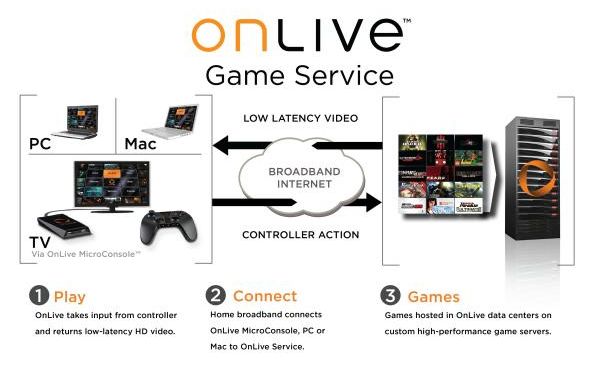OnLive Streaming Game Service To Go Live On June 17
Just when you were beginning to think "vaporware," OnLive has delivered
in the clutch. Nearly a year after being introduced to the world as the
future of remote gaming, this service has finally left the
"informational" stage at the GDC Expo in California. For those who
missed out on last year's news, OnLive is basically an online streaming
service that enables users to play games regardless of their location,
so long as their home Internet connection has enough upload speed to
push content to your current location.
Announced this morning in a San Francisco presentation, OnLive has finally opened up to the public after eight full years of development. Starting on June 17, 2010 (during E3), the OnLive Game Service will become available for users in the 48 contiguous United States. Basically, OnLive takes the console out of the equation, and it gives consumers the ability to play titles on "virtually any device" that has an Internet connection, all with the "same flexibility and instant-play experience that we’ve come to expect from online video and music."

Of course, the service won't be a free lunch. The base monthly rate is set at $14.95, while loyalty programs and other offers will be made available at E3. Also, the first 25,000 qualified people to register on the OnLive Game Service will have their first 3 months’ service fee waived. You should know that the monthly service fee doesn't include the rental or purchase of games, so that will be on top of the $14.95. There also seems to be a Steam-like methodology to adding friends and crafting profiles, and we're told that once you are on the service, instant-play, top-tier, newly-released games will be for sale and for rent on an à la carte basis. Exact pricing details are expected to be announced in June, but we are promised that they'll be "competitive."
Initially, OnLive will be offering the OnLive Game Service for PCs and Macs through a small browser plug-in, but later in the year the company will announce the public availability of the MicroConsole TV adapter, and they'll be "steadily expanding to other devices over time." Is this the death of the dedicated console? Hardly, but it's certainly a huge step in getting to the future of playing games wherever an Internet connection is available.

Announced this morning in a San Francisco presentation, OnLive has finally opened up to the public after eight full years of development. Starting on June 17, 2010 (during E3), the OnLive Game Service will become available for users in the 48 contiguous United States. Basically, OnLive takes the console out of the equation, and it gives consumers the ability to play titles on "virtually any device" that has an Internet connection, all with the "same flexibility and instant-play experience that we’ve come to expect from online video and music."
Of course, the service won't be a free lunch. The base monthly rate is set at $14.95, while loyalty programs and other offers will be made available at E3. Also, the first 25,000 qualified people to register on the OnLive Game Service will have their first 3 months’ service fee waived. You should know that the monthly service fee doesn't include the rental or purchase of games, so that will be on top of the $14.95. There also seems to be a Steam-like methodology to adding friends and crafting profiles, and we're told that once you are on the service, instant-play, top-tier, newly-released games will be for sale and for rent on an à la carte basis. Exact pricing details are expected to be announced in June, but we are promised that they'll be "competitive."
Initially, OnLive will be offering the OnLive Game Service for PCs and Macs through a small browser plug-in, but later in the year the company will announce the public availability of the MicroConsole TV adapter, and they'll be "steadily expanding to other devices over time." Is this the death of the dedicated console? Hardly, but it's certainly a huge step in getting to the future of playing games wherever an Internet connection is available.


